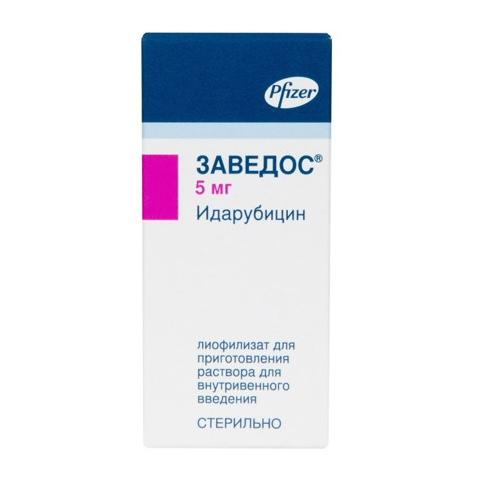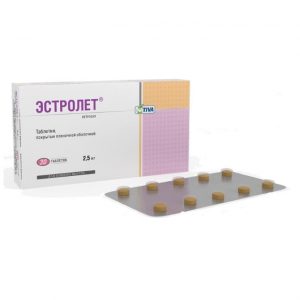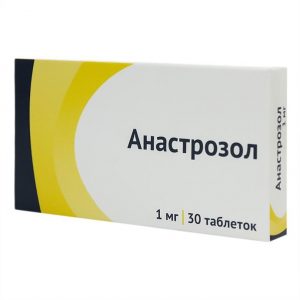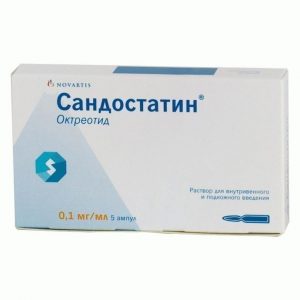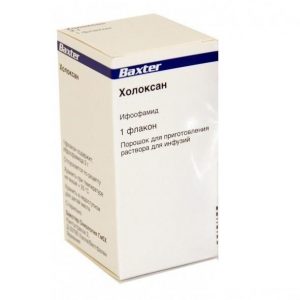Description
Latin name
ZAVEDOS
Release form
Lyophilisate for solution for iv administration.
Packing
1 pc
Pharmacological action
Pharmacodynamics
Antitumor drug from the group of anthracycline antibiotics. Idarubicin, integrating into a DNA molecule, interacts with topoisomerase II and inhibits the synthesis of nucleic acids. Idarubicin has a high lipophilicity and is characterized by a higher rate of penetration into cells compared with doxorubicin and daunorubicin.
The main metabolite of idarubicin – idarubicinol has antitumor activity and has less pronounced cardiotoxicity than idarubicin.
Pharmacokinetics
Absorption
When administered, absorption is high. The time to reach Cmax is 2-4 hours. Bioavailability is 18-39%. With the on / in the introduction of Cmax is achieved within a few minutes.
Distribution of
The capture of idarubicin by nucleated blood and bone marrow cells in patients with leukemia is very fast and almost coincides with its appearance in blood plasma. The concentrations of idarubicin and idarubicinol in the nucleated blood and bone marrow cells are more than 100-200 times higher than the corresponding plasma concentrations.
Metabolism and excretion
Idarubicin is rapidly metabolized to the active metabolite of idarubicinol.
It is excreted mainly in the form of idarubicinol with bile, as well as in urine unchanged (1-2%) and in the form of idarubicinol (4.6%).
T1 / 2 idarubicin after oral administration is 10-35 hours, after iv administration – 11-25 hours. Idarubicin is characterized by a longer T1 / 2 – 33-60 hours when taken orally and 41-69 hours – with iv administered. The rate of excretion of idarubicin and idarubicinol from blood plasma and cells practically coincides (terminal T1 / 2 of idarubicin from cells is about 15 hours, and idarubicinol is about 72 hours).
Indications
Acute non-lymphoblastic or myeloblastic leukemia in adults (first-line therapy for inducing remission, as well as in relapses or resistant cases)
acute lymphoblastic leukemia in adults and children (second-line therapy)
common non-breast cancer therapy (for breast cancer a line that does not include anthracyclines).
Contraindications
Severe hepatic or renal insufficiency
severe heart failure
recent myocardial infarction
clinically significant arrhythmias
persistent myelosuppression srldkrldrc or other hypersensitivity to idarubicin and / or other components of the drug, as well as to other anthracyclines and anthracene to dyons.
Caution: the drug should be prescribed for myocarditis, chickenpox, shingles, gout, or urate nephrolithiasis (history), infections, leukopenia, thrombocytopenia, elderly patients (over 60 years old).
Use during pregnancy and lactation
Zavedos is contraindicated in pregnancy and lactation (breastfeeding).
Patients of childbearing age receiving treatment with Zavedos should use reliable methods of contraception.
Composition
1 vial contains:
Active substances: idarubicin hydrochloride 5 mg.
Excipients: lactose.
Dosage and administration
The drug is administered iv in a jet (very slowly) for 5-10 minutes. To reduce the risk of extravasation, it is recommended that Zavedos be administered through the tube of the IV system (during the infusion of 0.9% sodium chloride solution).
Capsules are taken orally with a little water. It can be taken with food. The capsule should be swallowed whole (do not bite, do not dissolve, do not chew).
In acute non-lymphoblastic leukemia (ONLL) for adults, the drug is administered iv in a dose of 12 mg / m2 body surface area daily for 3 days (in combination with cytarabine) or 8 mg / m2 daily for 5 days as monotherapy or combination with other antitumor drugs. If intravenous administration is not possible, idarubicin is administered orally at 30 mg / m2 / day for 3 days as monotherapy or 15-30 mg / m2 daily for 3 days in combination with other anti-leukemia drugs.
In acute lymphoblastic leukemia, adults are prescribed 12 mg / m2, for children – 10 mg / m2, the drug is administered iv daily for 3 days as monotherapy.
With advanced breast cancer, the drug is prescribed orally as monotherapy at a rate of 45 mg / m2 for one day, or 15 mg / m2 / day for 3 days every 3-4 weeks, depending on the hematological status of the patient. With combined chemotherapy, the drug is used at a dose of 35 mg / m2 for one day.
All of the above schemes should be used taking into account the hematological status of the patient, as well as doses of other cytotoxic drugs used in combination therapy.
With impaired liver and kidney function, data on the use of the drug Zavedos are limited. With an increased content of bilirubin and / or creatinine in the blood serum, it is recommended to use the drug in reduced doses.
When the bilirubin content in the blood serum is within 1.2-2 mg%, the dose of anthracyclines is usually reduced by 50%, above 2 mg% – the drug is canceled.
Rules for the preparation and administration of
solution As a solvent for the drug Zavedos, only water for injection is used. To prepare a solution, 5 mg of the drug is dissolved in 5 ml of water for injection.
Side effects of
From the cardiovascular system: phlebitis, thrombophlebitis and thromboembolism, including pulmonary embolism. A manifestation of early (acute) cardiotoxicity is sinus tachycardia and / or ECG changes (non-specific changes in the ST segment or T wave). Tachyarrhythmias may also occur, including ventricular extrasystole and ventricular tachycardia, bradycardia, AV block, and bundle branch block. The occurrence of these phenomena is not always a predictive factor in the development of subsequently delayed cardiotoxicity, they are rarely clinically significant and do not require cancellation of Zavedosom therapy. Late (delayed) cardiotoxicity is usually observed during the last courses of therapy or several months or years after completion of therapy. Late cardiomyopathy is manifested by a decrease in the ejection fraction of the left ventricle and / or symptoms of congestive heart failure (shortness of breath, pulmonary edema, hypostatic edema, cardiomegaly and hepatomegaly, oliguria, ascites, exudative pleurisy, gallop rhythm). Subacute events (pericarditis / myocarditis) may also occur. The most severe form of cardiomyopathy caused by anthracyclines is life-threatening congestive heart failure, which limits the total dose of the drug.
From the hemopoietic system: leukopenia, neutropenia, thrombocytopenia, anemia. The number of neutrophils and platelets usually reaches the lowest values by 10-14 days after administration of the drug, the restoration of the blood picture is observed during the third week. Dose-dependent reversible leukopenia and neutropenia are a manifestation of toxicity, which limits the dose of the drug. The clinical manifestations of severe myelosuppression can be chills, infections, sepsis / septicemia, septic shock, hemorrhage and tissue hypoxia.
From the digestive system: nausea, vomiting, anorexia, dehydration, mucositis, stomatitis, esophagitis, abdominal pain, heartburn, erosion / ulcers of the gastrointestinal mucosa, diarrhea, colitis (including neutropenic enterocolitis with perforation), increased activity liver enzymes and increased bilirubin levels. Rarely, while taking the drug inside, the development of severe complications from the gastrointestinal tract (perforation, bleeding) was observed.
From the urinary system: red staining of urine within 1-2 days after taking the drug.
Dermatological reactions: alopecia, rash, itching, hyperpigmentation of the skin and nails, hypersensitivity of irradiated skin (response to radiation), urticaria and peripheral erythema.
Allergic reactions: flushing, anaphylaxis.
Local reactions: if the drug gets under the skin – the formation of blisters, severe cellulitis, necrosis of the surrounding soft tissues.
Other: hyperuricemia due to rapid lysis of tumor cells (tumor lysis syndrome), secondary leukemia with or without preleukemic phase (most often observed with the use of anthracyclines in combination with antitumor agents that disrupt DNA structure) with a latent period of 1 to 3 years.
overdose
Symptoms: manifestations of acute cardiotoxicity in the first 24 h (late cardiotoxicity may be observed several months after anthracyclines overdose) and severe myelosuppression (within 1-2 weeks).
Treatment: carry out symptomatic therapy.
Storage conditions
Keep out of the reach of children at a temperature not exceeding 25 ° C.
Lyophilisate is recommended to be used immediately after the first opening and subsequent restoration with a solvent.
Expiration
3 years.
Deystvuyuschee substances
Ydarubytsyn
dosage form
dosage form
infusion solution
